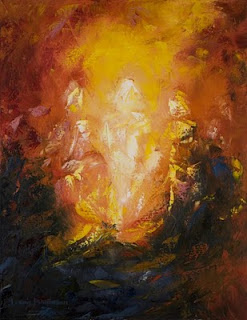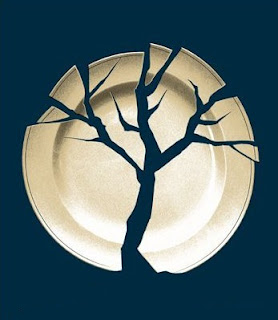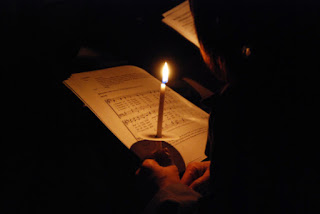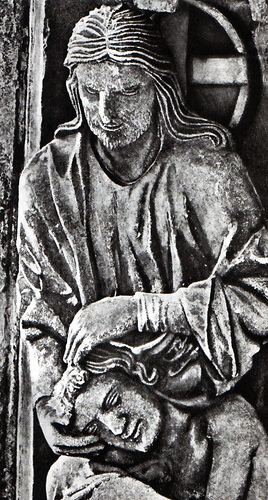 A number of times recently the commandment to "be ye perfect as your father in heaven is perfect" has come up for me. The first time was in an email to my director referring to the use of the term "total commitment" in something I was reading in relation to our work together. I wondered what "total" meant in the context involved; I couldn't understand it as even conceivable much less possible and that, it sounded like, could jeopardize everything. She wrote back pointing out the similarity of the word "perfect" in the NT and the difficulty of defining it. She then defined "total" contextually, in a less absolute (but no less personally demanding) way, a way which corresponded to the needs of the work being done and which, yet again, was a matter of "trusting the process" and the changes, healing, and growth it brings about. (This of course involves trusting the grace of God in all the ways it is mediated to me over time especially in this process!)
A number of times recently the commandment to "be ye perfect as your father in heaven is perfect" has come up for me. The first time was in an email to my director referring to the use of the term "total commitment" in something I was reading in relation to our work together. I wondered what "total" meant in the context involved; I couldn't understand it as even conceivable much less possible and that, it sounded like, could jeopardize everything. She wrote back pointing out the similarity of the word "perfect" in the NT and the difficulty of defining it. She then defined "total" contextually, in a less absolute (but no less personally demanding) way, a way which corresponded to the needs of the work being done and which, yet again, was a matter of "trusting the process" and the changes, healing, and growth it brings about. (This of course involves trusting the grace of God in all the ways it is mediated to me over time especially in this process!)
Other instances of meeting the word "perfection" had to do with Lent itself, with the God I was somehow supposed to come to image more perfectly and who was defined in static Greek categories: (omnipotence, omnipresence, etc). Another had to do with consecrated life and the older usage regarding being called to "a state of perfection". Again, I thought, as I always do, that being called to perfection meant being fully human because I think being authentically and fully human is at least part of this call to perfection --- but somehow the word "perfection" continued to raise obstacles within and for me. It is a problem all by itself. I would bet I am not alone in this. In fact I know I am not; one of the reasons women Religious don't often refer to "states of perfection" is because to do so seems elitist and divisive. It can also lead to needless or unwarranted anxiety over hypocrisy and failure.
 Last Sunday we celebrated the Feast of the Transfiguration. We often use the term transfiguration in the sense of change or transformation, but when we think about the transfiguration of Jesus the only thing that changed was the way Jesus appeared to others. Jesus was transfigured in their eyes but he himself remained who he was right along. The disciples saw him for who he really was, namely a truly human being living with, in, and towards life in God. They saw him as the glory of God, the revelation of the love and mercy which every human being is called and born to be. Whether they were aware of this or not, what James, Peter and John saw in Jesus was also an image of their own telos, the end or fulfillment of their own journeys to authenticity and maturity in, with, and through God. They saw an image of human perfection --- a man well on his way in his journey to fully reveal the glory of God in ordinary life situations. Jesus was heading towards Jerusalem with all that implied and involved; he was on his way to the Cross and the exhaustive revelation of a Divine power which would be perfected in weakness; he was on his way toward changing the very nature of reality by reconciling reality to God, destroying (Godless) death and by effectively giving creation a place in the very life of God. In other words, He was "perfect" (teleios) because he was "heading in the direction [he] was born for".
Last Sunday we celebrated the Feast of the Transfiguration. We often use the term transfiguration in the sense of change or transformation, but when we think about the transfiguration of Jesus the only thing that changed was the way Jesus appeared to others. Jesus was transfigured in their eyes but he himself remained who he was right along. The disciples saw him for who he really was, namely a truly human being living with, in, and towards life in God. They saw him as the glory of God, the revelation of the love and mercy which every human being is called and born to be. Whether they were aware of this or not, what James, Peter and John saw in Jesus was also an image of their own telos, the end or fulfillment of their own journeys to authenticity and maturity in, with, and through God. They saw an image of human perfection --- a man well on his way in his journey to fully reveal the glory of God in ordinary life situations. Jesus was heading towards Jerusalem with all that implied and involved; he was on his way to the Cross and the exhaustive revelation of a Divine power which would be perfected in weakness; he was on his way toward changing the very nature of reality by reconciling reality to God, destroying (Godless) death and by effectively giving creation a place in the very life of God. In other words, He was "perfect" (teleios) because he was "heading in the direction [he] was born for".So many times Jesus could have turned aside or away. There were so many times he could have chosen a different path, one which was good, fruitful, respectable, admirably religious and apparently "law abiding" --- but which was not about heading in the direction he was born to head. But, as he did during his time in the desert, he chose to do what he was born (or baptized) to do. He entered the desert having heard from God that he was God's beloved Son who did indeed delight God. He grappled with what that meant both in personal and pastoral terms. And finally he chose to respond to the deep call of God to be that person and live that identity in the ordinary and extraordinary things of life. This choice was one he renewed again and again throughout the course of his public life with every act of compassion and self-emptying; in the process he renewed the course of his journey with, toward, and on behalf of God's sovereignty and the extension of that "Kingdom of God" to all God holds as precious. He affirmed and reaffirmed a commitment to the same perfection we are each called to, namely an authentic and God-centered humanity lived for others. And isn't this what Lent gives each of us the space and encouragement to do?
 A few folks have emailed and suggested that by focusing on the work I have already been engaged in with my director I am failing to do what Lent really calls for. That, they believe, is inexcusable in a consecrated (canonical) hermit who lives this life in the Name of the Church! Apparently, they suggest, in outlining my plans for Lent I have not made a sufficient commitment to additional prayer, penance and almsgiving. But in (thus far) this 10 month-journey I have called "inner work" what my director and I have been engaged in is a profound desert-time where I grapple with 1) my identity and 2) with God's call to be myself as fully and freely as possible. This is the call to be perfect as God (Him)self is perfect --- nothing less.
A few folks have emailed and suggested that by focusing on the work I have already been engaged in with my director I am failing to do what Lent really calls for. That, they believe, is inexcusable in a consecrated (canonical) hermit who lives this life in the Name of the Church! Apparently, they suggest, in outlining my plans for Lent I have not made a sufficient commitment to additional prayer, penance and almsgiving. But in (thus far) this 10 month-journey I have called "inner work" what my director and I have been engaged in is a profound desert-time where I grapple with 1) my identity and 2) with God's call to be myself as fully and freely as possible. This is the call to be perfect as God (Him)self is perfect --- nothing less. We are each involved in a journey towards authenticity and (identically) communion with God. As with Jesus, it is a journey where we may have to renounce what is usually recognized as "respectability" in order to embrace genuine holiness --- just as we may need to embrace brokenness in order to be reconciled to God, self, and others to live the joy and freedom of life in and of God. The question Lent asks and gives us space and time to answer with our lives is, "are you headed in the way you were born to be headed?" Are you headed in the way your heart has been shaped throughout your whole life by the Love-in-Act we call God? If not, if you are impelled and even compelled by something else, how will you change course? What paths do you need to leave behind? What ways of being? What obstacles to freedom, personal deficits, woundedness, etc will you need to work through and let go of? How, after all, will you embrace the call to be "perfect", the call to be "heading in the direction you were born to be heading"?














































.jpg)























